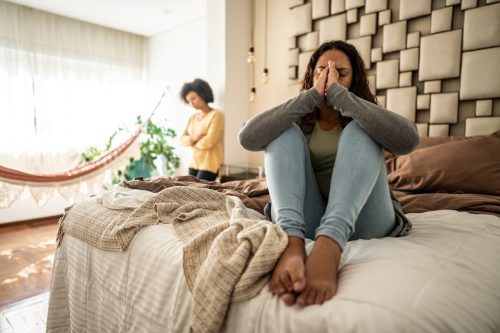How a "Sleep Divorce" Can Save Your Relationship, New Research Shows
If you can't get a good night's sleep in bed with your partner, consider a new arrangement.
Waking up after a poor night's sleep is never pleasant. Waking up after a poor night's sleep due to your partner snoring, tossing and turning, or hogging the bed is unpleasant and breeds resentment and perhaps even jealousy over their restful slumber—which is why the concept of a "sleep divorce" is becoming more mainstream.
In this arrangement, couples (who we should note very well may be otherwise happy and fulfilled in their relationship) decide to sleep in separate beds or bedrooms, whether that's every night, only on weeknights, or on a more flexible schedule. And while the term "divorce" has inherent negative connotations for a relationship, new research is shedding light on just how positive this trend can be. Keep reading to learn what a sleep divorce really is, how it can make or break your relationship, and whether it's right for you.
RELATED: What Your Sleeping Style Says About Your Relationship, According to Therapists.
Lack of sleep can have serious consequences.

For most adults, the Sleep Foundation advises "at least seven hours of sleep each night for proper cognitive and behavioral functions." A consistent lack of sleep can increase the risk for conditions and diseases such as "obesity, Type 2 diabetes, high blood pressure, heart disease, stroke, poor mental health, and early death," the institution shares.
Moreover, it can greatly impact your mood and how you interact with others. "Poor sleep can tremendously impact your relationship," shares Chris Winter, MD, neurologist and Mattress Firm's sleep health expert. "People are more irritable, less able to read emotions, more impulsive, and more prone to depression if they aren't getting adequate sleep."
Yet, according to a 2022 poll conducted by Gallup in partnership with mattress brand Casper, one in three American adults describe their sleep as "fair" or "poor."
Which is why some couples are turning to sleep divorces.

A 2023 sleep survey from U.S. News & World Report found that roughly 33 percent of respondents prefer sleeping in a separate bed than their partner, signaling that this idea isn't quite so unusual. In fact, just recently, Cameron Diaz said, "We should normalize separate bedrooms," while appearing on Molly Sims' and Emese Gormley's podcast Lipstick on the Rim.
As CNN reported, Diaz, who says she is happily married to husband Benji Madden, went on to share, "To me, I would literally, I have my house, you have yours. We have the family house in the middle. I will go and sleep in my room. You go sleep in your room. I'm fine. And we have the bedroom in the middle that we can convene in for our relations."
The merits of a sleep divorce aren't just anecdotal, however. A recent study published in the journal Current Biology shows that "co-sleeping isn't always positive, and insomnia can be transmitted between bed partners," according to a press release.
To arrive at their findings, researchers from the University of Michigan "tracked the sleep behavior of mice while in a social context." They found that, while the mice craved close contact, they often woke each other up.
RELATED: 7 Things Divorced People Wish They Had Done Differently in Their Marriage.
Therapists agree that a sleep divorce can be a positive change.

Therapists who work with couples also support sleep divorce as a solution, as it can lessen feelings of resentment.
"Our ability to get supportive sleep is associated with our relational health. Partners who sleep better are more empathic, compassionate, intentional, and flexible," shares Domenique Harrison MPH, LMFT, LPCC, a relationship therapist known as The Racial Equity Therapist.
"A sleep divorce also invites partners to be open and direct about their needs, wants, and desires. Partners are more courageous, stand in their integrity, and take healthier relational risks," she adds.
But the experts have advice on sleep divorcing correctly.

While Harrison generally is in favor of sleep divorces, she does point out that there are certain steps to take for a healthy arrangement. First, she recommends ensuring both partners are on the same page to begin with and then continue to check in with each other.
"Some additional things to explore regarding a beneficial sleep divorce include sleep norms, stigmatized stories about 'sleeping in different beds and rooms,' and each partner's positive and negative feelings/narratives about a sleep divorce," she says.
Of course, intimacy is another big question mark when it comes to a sleep divorce, and the experts agree that it's important to carve out dedicated time for this.
"Try picking one bed that is used for intimacy and scheduling sex regularly to help ensure that both of your physical needs are being met," suggests Shelby Harris, PSYD, DBSM, a licensed clinical psychologist and director of sleep health at Sleepopolis.
Suzannah Weiss, relationship coach and resident sexologist for the pleasure product brand Biird, recommends building a bedtime routine to feel even closer to your partner.
"You can take turns tucking each other in, brush your teeth together, or just make sure to kiss each other goodnight. You can also make a point to hug and/or kiss when you get up in the morning," she shares with Best Life. "Another fun thing to do might be to have occasional sleepovers and make a night of it. Make popcorn, watch a movie together, and cuddle before you fall asleep in the same bed."
RELATED: 5 Signs Your Relationship Is Headed for a "Gray Divorce," Therapists Say.
And it doesn't have to be an every-night thing.

Divorce implies permanence, but a sleep divorce can take different forms and evolve over time. For example, some couples only sleep separately during the week—this is especially common if one partner has a very different work schedule.
If you're not ready to commit to a complete sleep divorce, Winter suggests sleeping apart only on certain days of the week. "This falls under the category of 'two days of good sleep are better than none,'" he says. "Doing this can eliminate the guilt that you're not sleeping together, it allows you to get needed sleep, and it gives you the opportunity to figure out if your spouse is really your sleep saboteur."
In some cases, a sleep divorce can signal trouble.

In Harrison's professional opinion, a sleep divorce can point to trouble in the relationship when it's being used to avoid larger issues.
"When partners agree to a sleep divorce, put the practice in place, and avoid all that led them to the decision, they create a new relational pattern that is walled off, assumptive, and disconnected," she explains.
And, of course, if one partner isn't wholly on board with the plan, it can stir up the very feelings of resentment that sleep divorces seek to eliminate.
"Having to surrender to something that you did not choose can cause more stress and trauma in the relationship," notes Harrison, who adds that this person may feel "loneliness, conflict, threat, rigidity, and insecurity" as a result.
As with most relationship issues, the key here is open and honest communication—and perhaps a new set of bedding.
For more relationship advice sent directly to your inbox, sign up for our daily newsletter.






















